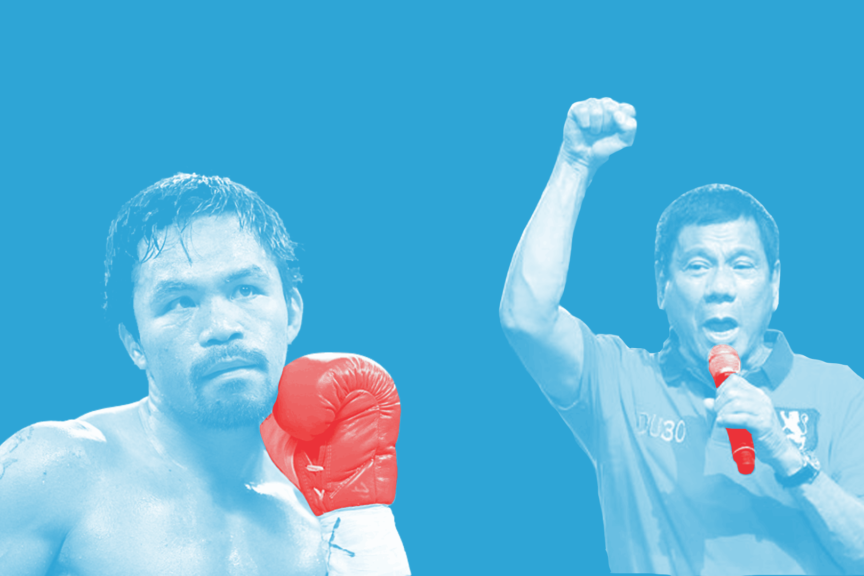Manny Pacquiao and Rodrigo Duterte support the death penalty for drug crimes
Pacquiao’s drive to reinstate capital punishment for drug crimes is in line with President Duterte: “If you know of any addicts, go ahead and kill them yourself, as getting their parents to do it would be too painful.”

Psymposia is a 501(c)(3) nonprofit research and media organization that offers critical perspectives on drugs, politics, and culture. We rely on contributions from our readers and listeners. Your support is vital to sustaining Psymposia.
Support Psymposia’s independent journalism on Patreon and help us drive the Mystery Machine! We’re a bunch of meddling kids who are unmasking the latest shenanigans on the psychedelics beat.
Manny Pacquiao, the former world champion boxer, has lofty ambitions for his new role as a Senator of the Philippines. In addition to his hopes to provide free elementary-to-college education to children of low-income families, he also plans to reinstate the death penalty for “heinous crimes,” including drug dealing and trafficking. He supports death by hanging rather than gunfire, as he believes hanging is more “humane.”
Use of the death penalty has varied throughout the history of the Philippines. President Ferdinand Marcos (1965-1986) used it generously and applied it to drug crimes, until 1987 when a new government and Constitution abolished the punishment. It was reinstated again in 1993 after a rise in crime rates, and 1,100 people were sentenced to death between 1993 and 2000. Seven people were executed. In 2000 President Estrada halted use of the death penalty in response to rising criticism from Christian groups, and no more executions took place in the early 2000’s. The death penalty in the Philippines was finally abolished in 2006 by Congress and President Gloria Macapagal-Arroyo.
Pacquiao’s drive to reinstate capital punishment for drug crimes is well in line with the dreams of his political ally and newly elected President of the Philippines, Rodrigo Duterte. Duterte spoke before a crowd in Manila on July 1 after being sworn into office: “If you know of any addicts,” he cautioned, “go ahead and kill them yourself, as getting their parents to do it would be too painful.”
Outrageous though it may sound, this statement is not surprising coming from Duterte. Before being elected in May of this year, he made a campaign promise to execute 100,000 criminals and dump their bodies in the Manila Bay.
Duterte’s emphatic embrace of violent crime control goes back to his tenure as mayor of the city of Davao, when he was involved with death squads responsible for over 1,000 extrajudicial killings. “Am I the death squad?” Duterte said on his live television show in May. “True. That is true.” According to Human Rights Watch, these death squads killed hundreds of street children, petty criminals, and petty drug dealers. The killings have continued and have even inspired “copycat killings” in other Philippine cities. To date, none of the killings have been successfully prosecuted.
President Duterte’s brutal crackdown on drug dealing has become his first accomplishment in office. Conor Gaffey of Newsweek reports that within 4 days of his swearing in, authorities have killed 30 drug dealers and seized about $20 million worth of narcotics. Al Jazeera estimates the number dead to be 45.
“If I couldn’t convince you, I’ll have you killed. If you are into drugs, I’m sorry. I’ll have to apologize to your family because you’ll surely get killed.”
Duterte and his punitive drug policies are a response to the country’s high rates of drug use – in particular that of methamphetamine, known locally as shabu. In 2014, the Philippine Drug Enforcement Agency (PDEA) reported that 20.5% of the country’s 42,065 “barangays,” or villages, were affected by the drug trade. Metro Manila, the capital, had the highest rate of drug dealing with 92% of its barangays being affected. Based on arrest data, shabu was the most used drug, making up over 88% of seizures. Cannabis followed with over 8% of arrests.
The PDEA reports how drug syndicates have produced shabu locally since 2010: “Medium-type to kitchen-type shabu laboratories have resorted to operations in posh villages and condominiums in order to further conceal their activities. Private properties are becoming the popular target of syndicates in manufacturing illicit drugs, mainly due to the lower risk of detection these locations provide.” Both local and foreign syndicates are involved in the Philippine drug trade, with Mexican and Chinese cartels having been implicated in recent years. The island country’s location in the Pacific Ocean makes it a strategic hub for the global drug trade.
The PDEA claims that Ninoy Aquino International Airport in particular is a primary site of both small and large-scale drug smuggling, with drug mules concealing drugs in their suitcases, luggage, shoes, bottles, parcels, and more extreme hiding places: “Others go as far as wrapping up drugs around their body, undergoing minor surgery to put the drugs inside their body or ingesting the dangerous drugs to avoid detection. Female drug couriers were found to be forced to insert the package into their private parts while male drug mules are instructed to insert the drugs directly into their anuses.”
It remains to be seen whether Manny Pacquiao and President Duterte’s policies will have a lasting impact on the country’s rates of drug use and smuggling. But for now, the killing of drug dealers and users will continue. Duterte has proven that in achieving this goal, he is more than competent.
Hey! Before you go… Psymposia is a 501(c)(3) non-profit media organization that offers critical perspectives on drugs, politics, and culture. We strive to ask challenging questions, and we’re committed to independent reporting, critical analysis, and holding those who wield power accountable.
Our perspectives are informed by critical analysis of the systemic crises of capitalism that have directly contributed to the unmitigated growth of addiction, depression, suicide, and the unraveling of our social relations. The same economic elite and powerful corporate interests who have profited from causing these problems are now proposing “solutions”—solutions which both line their pockets and mask the necessity of structural change.
In order for us to keep unpacking these issues and informing our audience, we need your continuing support. You can sustain Psymposia by becoming a supporter for as little as $2 a month.






